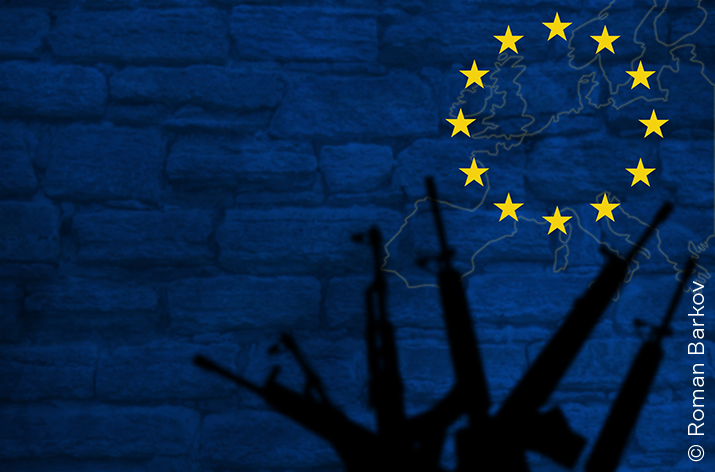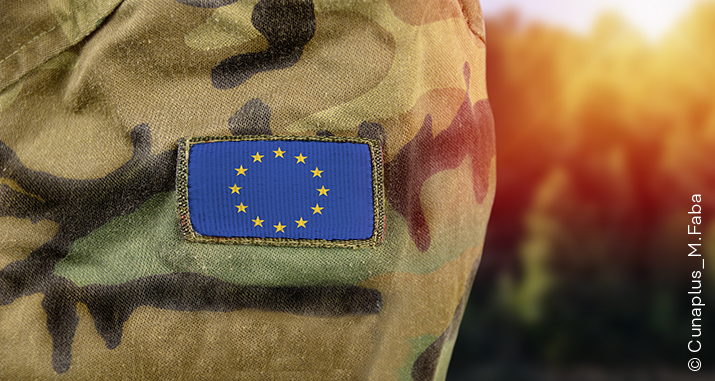The association may seem unusual, especially as it comes from the head of the Foundation which, in a broad sense, has the aim of spreading the values of peace and harmonious coexistence between peoples and nations, but if today I were asked to identify two themes to which the future destinies of Europe are closely linked, my choice would be "environment" and "defence".
With regard to the first issue, the objective is to eliminate the so-called greenhouse gas emissions by 2050, thus fulfilling the commitments undertaken with the historic Agreement signed in 2015 in Paris and thereby guaranteeing climate neutrality (" net zero”), through the perfect balance between new emissions and the absorption of existing ones.
The second, however, is a question of achieving operational autonomy on a military level, without acting prematurely but at the same time without excessive delays. This would allow the governments of the Old Continent to effectively protect their borders (and, what matters most, the existence and material and value-based acquis of its citizens) without necessarily having to depend on external aid (obviously except for the member states guaranteed an "umbrella" by NATO).
Again, in the opinion of the writer, if the objectives seem clear, namely those necessary to pass down living conditions at least equivalent to ours to future generations, what appears decidedly more complex is pinpointing the "dosage" of public measures capable of guaranteeing their achievement. This holds true in particular, with regard to how they may be accepted by the community and relevant interest groups.
Let's take the fight against global warming: the so-called green deal cannot be substantially achieved without the imposition of restrictions on categories of companies whose production derives from highly "polluting" processes. And it is no coincidence that the European Parliament, not insensitive to the mood of its electoral body and least of all on the eve of a fundamental appointment with the polls, has recently relaxed community rules (regarding for example pesticides, breeding and packaging) whose original greater severity was precisely intended to accelerate the green transition. It was then discovered, perhaps somewhat belatedly, that once put into practice they would have caused very serious consequences in terms of employment in the vast majority of countries. Just as it is not surprising that the President of the European Commission, Ursula von der Leyen, although a convinced supporter of the green deal, has in recent weeks publicly recognised the need to proceed on the matter gradually and with greater caution, in the name of Realpolitik that is difficult to set aside.
Moving on to European defence, the main obstacle to the indispensable streamlining of policies is represented by the lack of cooperation among its 27 EU members, each of which persists in favouring a national course of action, regardless of the perverse effects caused by very expensive and often redundant duplications. Nor does it seem to cause too much worry to those who govern us that 90 percent of the resources assigned to the research and development of new military technologies continue to be managed by the individual capitals, while the European Defence Fund, established in 2021, is allocated very limited funding. Bearing this in mind, the very recent announcement by the President of the Commission in favour of the creation of a European Ministry of Defence, in the event of her re-election, could constitute a turning point in the right direction.
The undoubted objective difficulties outlined so far must not, however, lead the current European leaders to relinquish goals that cannot be postponed, otherwise the authority of the Old Continent on the international stage might be substantially reduced.
It is significant that the leadership in office is able to draw the political courage necessary for the above-mentioned reforms (essentially the green deal and the European army) from the proven existence of ample margins of support among their citizens. If their plebiscitarian support for measures in favour of the environment has no need for comment, the result of the Eurobarometer findings (an agency linked to the Brussels Commission) most likely brings some element of surprise as they indicate that 4 European citizens out of 5 have remained in favour of the creation of a common European defence and security policy for some years, which can only be achieved in fact, through close coordination between the 27 EU countries.
This broad support is also undeniably affected by the effects of the current, dramatic international situation, characterized by the simultaneous progression of two large-scale conflicts (as well as the uncertain duration), by the extreme aggressiveness of a regime (that of Russia) which reminds us of the disturbing decades of the "cold war" and the ever-looming threats of fundamentalist terrorism (the very recent, criminal attack on a concert hall in Moscow constitutes tragic proof of this). To these factors of concern could be added, in the coming months, the change of tenant in the White House (see previous issue of the «Voice»), most likely accompanied by a profound revision of Uncle Sam's international priorities, with the Indo-Pacific region surpassing the Euro-Atlantic side in terms of relevance.
In conclusion, today there is more than enough concrete evidence on the table as well as crisis scenarios that for the moment are under control, but which could eventually get out of hand (Taiwan for instance). Also, within the context of the crucial June meeting, Europe would therefore be well advised to promote a serious examination of conscience, in order to clearly identify its priorities (two of which we have briefly discussed above) and to find not only the courage (let us remember the need to innovate in relation to the current system of unanimity in defence decisions) but also the political ambition to implement major reforms. As should be the case, these must be respectful of the rights and consolidated interests of citizens. They should also be immovable in rejecting attempts at conditioning in a "conservative" sense that the influential and deep-rooted power lobbies active within the Union would contrive without any doubt.
Reggente Marco Marsilli, Foundation President











